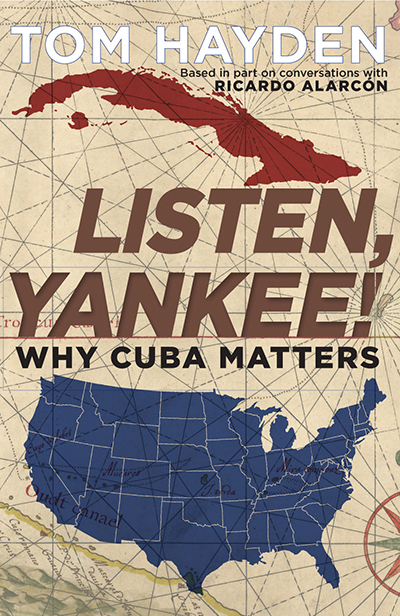In the following book excerpt, Tom Hayden provides examples of “the price we have paid for isolating ourselves from Cuba”:
In writing the book Listen Yankee! Why Cuba Matters I have gained new information and insights on several chapters of historical interest, information that should help us understand the history of Cuba and the United States in new ways that will stand in stark contrast to the story told in the American media. Most of these insights illustrate plainly the price we have paid for isolating ourselves from Cuba:
– That Cuba countered the US effort at isolation effort at isolation with foreign policies that have had a global impact completely out of proportion with its being a tiny country of eleven million people. Most recently, Cuban medical personnel have made the “most robust” contribution of any country in the world to the fight against the Ebola epidemic. Similarly in 2011 the Cubans were at the forefront of the battle against cholera in Haiti. Cuba has sent many thousands of doctors, nurses, teachers, and other specialists on humanitarian missions to third world countries. These programs surpass in scale the American Peace Corps, which was designed by the Kennedy administration as a free-world answer to Cuba. Decades ago, the Cubans made a dramatic decision to send tens of thousands of troops to fight against colonialism in Angola and the apartheid regime in South Africa in the seventies. Cuba gained enormous respect and even a heroic status globally by its efforts. Meanwhile the United States was opposing sanctions and divestment against South Africa and offering only “quiet diplomacy” and “constructive engagement.” Ricardo [Alarcón] was a signatory to the peace agreement in southern Africa and talks about that experience here. As a result, Cuba became the leader of the Non-Aligned Movement among third world nations during the late sixties, and gained the support of Latin America, Asia, and Africa within the UN General Assembly;
– That the draconian US policies of nonrecognition often led to follies in practical diplomacy. Ricardo enjoyed handshakes and cocktails with top American officials in southern Africa while remaining officially a nonperson in terms of US diplomacy. US talks with Ricardo Alarcón on serious issues like immigration required him to be hidden in the backseats of official cars or spirited to secret meetings in Toronto hotels—without the knowledge of the very US officials technically in charge of Cuba policy;
– That such secret contacts were considered necessary by the White House because the Cuba lobby had infiltrated key offices within the US executive branch;
– That Ricardo was engaged in top-secret talks with top US officials while at the same time being rejected in his visa requests to visit the United States at the invitation of members of Congress;
– That the federal government kept secret its plans to return six-year-old Elián González to Cuba in June 2000 because the Miami FBI, police and media were considered too closely connected to Cuban exile groups; the de facto conspiracy to return Elián González was coordinated between US officials and Ricardo Alarcón, who welcomed the youngster home at Havana’s international airport;
– That the federal government and CIA built and granted immunity to a de facto armed settler sanctuary in Miami, a “Mafia state” to Ricardo Alarcón, for training and weapons stockpiling, putting lethal power in the hands of the exiles launching attacks on Cuba. All this was in the name of exporting democracy to Cuba while it left a cancer on democracy in the United States;
– Ironically, members of Ricardo’s generation, symbolized by Fidel and Che, have been resurrected as heroic icons in the triumphant democratic revolutions across Latin America over the past twenty-five years;
– That solidarity work and cultural exchanges allowed the Cuban Revolution to build a significant base of support for Cuba in the United States, circumventing the walls of the embargo. The cane-cutting solidarity movement known as the Venceremos Brigades sent at least eight thousand Americans to work and learn in the Cuban countryside over two decades, with 1,300 in 1969-1970, more than 1,100 volunteers who journeyed to Mississippi in 1964 for the far more visible Freedom Summer project. In both cases the thousands of volunteers were taking risks; the Venceremos volunteers by breaking the travel ban, the Mississippi volunteers suffering three deaths and many arrests. More so-called solidarity movements would grow during the Central American Wars of the 1970s-1980s. Many of those brigadistas later became mayors, members of Congress, and influential Americans in many fields. They are an invisible backbone of support for normalized relations today.
In addition, hundreds of thousands of Americans have visited Cuba, legally and illegally, as tourists, most of them bringing back deep sympathy for the island. Those two blocs – solidarity activists and progressive tourists – have given Cuba an important and growing base of sympathetic support within the United States, a potential counter to the Cuba lobby’s crusade to demonize the island. Now that the road to normalization has been chosen, those networks of support will be key bridges in bringing our two peoples together. In addition, they should be recognized as an important source of influence on Cuba’s evolution in human rights and democracy, a constructive alternative to the failed and contradictory US policy of covert “democracy programs.”
Copyright (2015) by Tom Hayden. Reprinted with permission of the publisher, Seven Stories Press.
Join us in defending the truth before it’s too late
The future of independent journalism is uncertain, and the consequences of losing it are too grave to ignore. To ensure Truthout remains safe, strong, and free, we need to raise $31,000 in the next 48 hours. Every dollar raised goes directly toward the costs of producing news you can trust.
Please give what you can — because by supporting us with a tax-deductible donation, you’re not just preserving a source of news, you’re helping to safeguard what’s left of our democracy.
